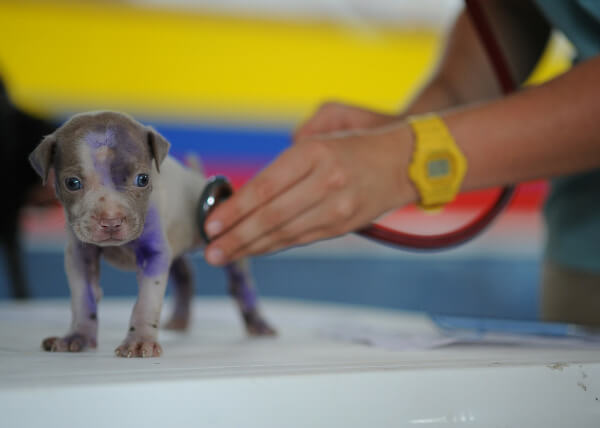FYI: If you buy something through a link on this site I may earn a commission - at NO extra cost to you.
Hypoglycemia in Dogs
Hypoglycemia in dogs is a condition which occurs when the concentration of sugar (aka glucose) in Fido's bloodstream drops rapidly.
Low blood sugar in dogs is a dangerous problem, and you need to treat it as an emergency.
Glucose reaches the bloodstream in three ways:
- From food (especially carbohydrates)
- Produced by body chemicals (process of Gluconeogenesis)
- From stored glucose in the body (process of Glycogenolysis)
Each of these routes can breakdown for a number of reasons, and cause the plunging blood sugar levels which result in hypoglycemia.
Canine hypoglycemia can also be a symptom of several different diseases or illnesses, and although puppies and small/toy/tiny dogs are more prone to developing this condition, it can happen to any dog regardless of size/age/breed.

Causes of Hypoglycemia in Dogs
Hypoglycemia can affect puppies and dogs for a wide variety of reasons:
Size, Age, Breed
Smaller puppies and dogs have a bigger brain in comparison to body weight than larger breeds.
This is because their brain's need for glucose is sometimes greater than their body can supply and store.
Young puppies (under four months old) are also at higher risk because their bodies aren't able to regulate blood sugar as effectively as those of adult dogs.
This is especially true for tiny and toy breed puppies.
Sometimes tiny and toy breed dogs have a genetic predisposition to suffering from hypoglycemia.

Very young puppies can experience a drop in blood sugar levels if they get exhausted or anxious, or even if they get too cold (especially during the first two or three weeks of life).
Lack of Nutrition
Missing a meal, or several meals, can cause blood sugar levels to drop in any puppy or dog. This can cause hypoglycemia.
Again, tiny and toy breeds are more at risk of this happening due to the way their bodies work.
Small breeds have tiny tummies which can't hold a lot, plus their metabolism is fast so they use up the nutrients quickly.
This means they don't store glucose in sufficient quantities to allow them to go long between meals.
Small and tiny breeds need to eat little and often to keep their blood sugar levels stable.
If your puppy isn't eating enough, he may develop hypoglycemia in addition to whatever is causing the appetite loss in the first place.
This is even more likely to happen if the lack of food is combined with vigorous exercise due to the excessive use of energy (and therefore fuel, ie glucose, stored in the body).
Canine intestinal worms can steal all the nutrition from a puppy (or dog's) food, basically causing him to starve, this can also lead to hypoglycemia.
Sometimes it's recommended to 'fast' a dog who is having tummy troubles for 24 hours (puppies for 12 hours), or prior to surgery.
In these situations it's always wise to be on the lookout for signs of hypoglycemia so that you can take action quickly if they appear.
Illness or Disease
There are a number of health conditions which can cause hypoglycemia in dogs, these include:
Diabetes
Diabetes is the disease that we most often think of when blood sugar is the problem.
A dog who is diabetic will suffer from erratic blood sugar levels which need to be controlled either by diet or insulin or other medications to prevent serious problems.
Diabetes can cause low blood sugar, especially if the dog isn't eating often enough of is exercising vigorously.
Also, when insulin is given to treat diabetes, too much of it can cause a drop in blood sugar.
Treating diabetes in dogs is a delicate balance.
Pancreatic Disease
The pancreas is the organ which produces insulin so if it is diseased blood sugar levels can be affected.
Insulinomas are tumors of the pancreas which can cause insulin levels to rise, as a result blood sugar levels fall... and the end result is hypoglycemia.
Addison's Disease
Addison's is a disease of the adrenal glands which causes certain hormone levels to drop, this can cause hypoglycemia in dogs (as well as numerous other issues such as electrolyte imbalances and an irregular heartbeat).
Liver Disease
If the liver is compromised and produces less glucose it can lead to hypoglycemia in dogs.
Poisoning
Ingesting some toxic substances can cause a rapid drop in blood sugar in dogs.
Two of the most common culprits are Xylitol (an artificial sweetener found in gum, hard candy and other sweets) and car anti-freeze.
Both of these are extremely dangerous, and usually result in fatal poisoning.
Symptoms of Hypoglycemia in Dogs
The body glucose (form of sugar in the blood) is needed for all brain functions and when glucose levels are low, or drop, the effect is often neurological but can affect all body systems.
The most common symptoms of hypoglycemia in dogs include:
- Lethargy or weakness
- Shaking or trembling
- Loss of appetite
- Loss of co-ordination or balance
- Nervous or agitated behavior
- Muscle twitching
- Disorientation or confusion
- Heart arrhythmia or change in heart rate
- Reduced vision or even loss of vision
- Dilated pupils
- Excessive panting or pacing
- Diarrhea
- Vomiting
- Loss of bladder control
- Seizures
- Loss of consciousness or collapse
Many of the above symptoms could point to a number of different dog illnesses or conditions, but they are all signs of serious pain, distress or illness.
Glucometers for Home Use on Dogs & Cats
Do you...
- Own a tiny or toy breed?
- Breed tiny/teacup dogs?
- Have a dog who has experienced hypoglycemia before?
- Own a dog who has diabetes?
If so, then it's a good idea to have a glucose meter on hand to test your dog's blood sugar levels regularly.
The AlphaTrak2 or the Advocate PetTest kits are specifically designed for use on dogs.
Treating Hypoglycemia in Dogs
If you think your dog may be suffering from hypoglycemia it is an emergency situation and you need to get him to your vet, or a 24 hour pet hospital/clinic immediately.

With hypoglycemia things can get serious very quickly, so it's important to raise your dog's blood sugar level as soon as you can.
Luckily there are certain things that most of us have in our kitchen which will take care of this and buy your pet some very valuable time so that he can get the expert attention he needs.
Due to the weakness, confusion and loss of appetite shown by dogs with hypoglycemia, you are unlikely to be able to convince Fido to eat anything helpful.
However, you CAN drizzle or syringe about one teaspoon of some type of sweet solution such as Karo syrup or maple syrup directly into his mouth and also rub it onto his gums so that it will be absorbed into his bloodstream quickly.
If you don't have any of the above, even some Haagen Dazs vanilla ice-cream could help.
Once the sugar levels stabilize your dog will feel better and should start to act more normally.. but this doesn't mean he is fine!
Don't attempt to do this to a dog who is having a seizure as you may get hurt.
It's vital to have him examined by a veterinarian right away to make sure that his glucose levels stay within normal range (he may still need an IV glucose solution to stabilize him) and to find out what causes the drop, and resulting symptoms.
you might also like...
- Home
- Illnesses & Disease
- Hypoglycemia in Dogs
FTC Disclosure: Some pages on this site contain affiliate links. I may earn on qualified purchases.





